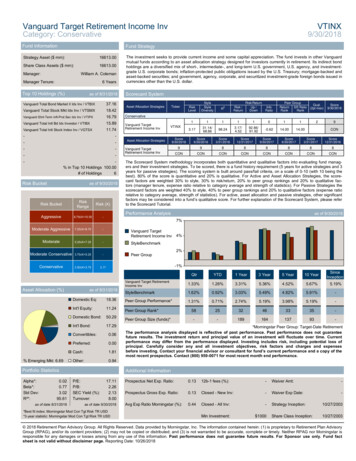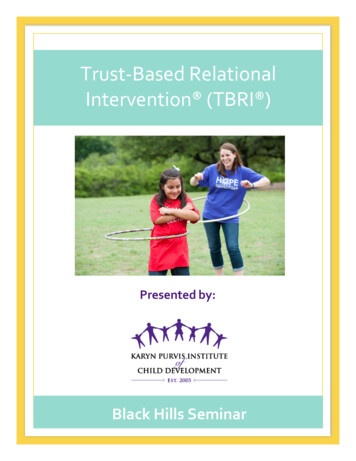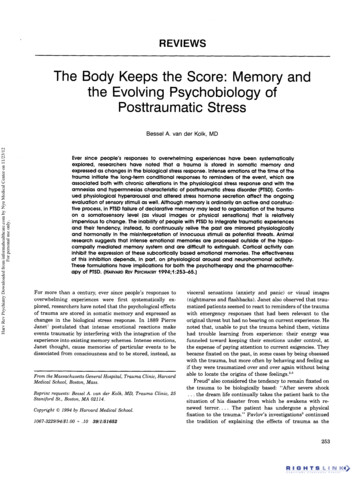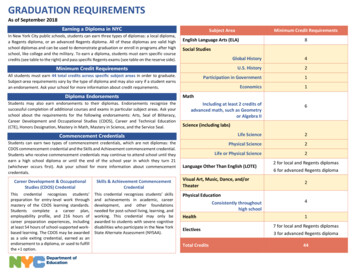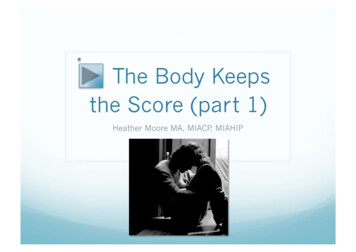
Transcription
The Body Keepsthe Score (part 1)Heather Moore MA, MIACP, MIAHIP
Vicarious Trauma! Studies in the past 20 years indicate thattherapeutic/pastoral work with those whohave been traumatised can impair thepsychological, physical and spiritualfunctioning of helping individuals! The term vicarious trauma (VT) refers to thecumulative negative trauma responses asdescribed in Post Traumatic Stress Disorder(APA, 2000), which are then manifested inthe person
Vicarious Trauma! It builds up over time as a result of constantexposure to narratives of cruelty, sadism, neglect,abuse and exploitation! This can result in dire personal consequencescausing disruption to the therapists’/carer’s senseof self, sense of other, worldview and belief system
Burnout! A well-researched subject especially, insocial and organisational contexts! Overwhelming fatigue or exhaustion! Detachment, de-humanised, or cynicismtowards people at work; labelling individualsin derogative ways! Reduced personal accomplishment
Burnout! Due to work overload! Limited collegiate support/social support! Role ambiguity, increase in your roles! Unrealistic expectations of the self
Burnout! Consequently individuals work harder toachieve satisfaction! They cease/give up work! Function at a minimum potential orcreativity! Spillover to home/personal life! Increase in alcohol & nicotine consumption
Compassion Fatigue! “We have not been directly exposed to the traumascene, but we hear the story told with suchintensity, or we hear similar stories so often, or wehave the gift and curse of extreme empathy andwe suffer. We feel the feelings of our clients. Weexperience their fears. We dream their dreams.Eventually, we lose a certain spark of optimism,humor and hope. We tire. We aren’t sick, but wearen’t ourselves.”!C. Figley, 1995
“First, you should understand that it’s a process. It’snot a matter of one day, you’re living your life with agreat deal of energy and enjoyment, and the next,you wake up exhausted and devoid of any energy –both physical and emotional. Compassion fatiguedevelops over time – taking weeks, sometimes yearsto surface. Basically, it’s a low level, chronicclouding of caring and concern for others in your life– whether you work in or outside the home. Overtime, your ability to feel and care for others becomeseroded through overuse of your skills of compassion.You also might experience an emotional blunting –whereby you react to situations differently than onewould normally expect.”When Helping Hurts by F. Oshberg, MD
Compassion Fatigue! Compassion fatigue has a more rapid onset whileburnout emerges over time. CompassionFatigue has a faster recovery (less severe, ifrecognized and managed early).! The ABC’s of Prevention: Minding your SelfAwarenessBalanceConnections
Burnout in the Church! Splitting in individuals can result in secondarytrauma in caregivers, which can lead to splits inChristian communities! Scapegoating, Paranoia/ Crustaceans/Amoeboid! Open dialogue in organisations can serve to identifyand heal these splits in teams. In any humanendeavour we find elusive, invisible processes atwork, which can enhance or hinder the creativefabric and the integrity of health settings
Vicarious Resilience! A relatively new concept developed by Hernandez,Gangsei & Engstrom (2007)! Based on their research with psychotherapists whotreated victims of political violence and torture! Vicarious Trauma and Vicarious Resilience are bothseen as natural and normal processes that candevelop in the context of trauma work with onepositively counterbalancing the other
Vicarious Resilience! Work with traumatised individuals can transformour worldview positively, amplifying our compassionand spirituality. Spirituality and faith enrichmeaning which which may be a protective factor incountering the effects of VT and restoring hope! VR is the process of clinicians learning aboutovercoming adversity/suffering from the verysurvivors they work with
Vicarious Resilience! Results in a positive transformation andempowerment in carers through their empathicengagement with resilience of their clients (like VTbut in a positive healing direction)
The Body Keeps the Score (part 1) Heather Moore MA, MIACP, MIAHIP . Vicarious Trauma ! Studies in the past 20 years indicate that therapeutic/pastoral work with those who have been traumatised can impair the psychological, physical and spiritual functioning of helping individuals !



